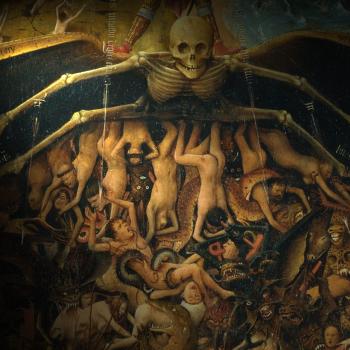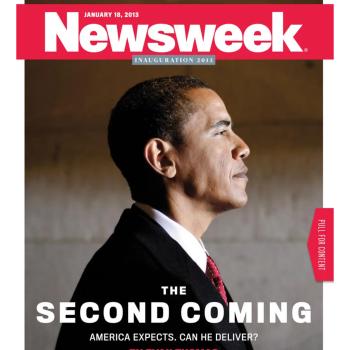Guest post by Miles S. Mullin II, of Southwestern Baptist Theological Seminary’s J. Dalton Havard School for Theological Studies
As Election Day approaches, most coverage of the presidential campaign focuses on the policy differences between President Obama and challenger Mitt Romney. Certainly these differences deserve careful attention. But there’s a biographical similarity that the media has badly neglected: their quintessentially American stories of personal achievement keyed by religious commitment.
Without question, Mitt Romney had a privileged upper-class childhood as the youngest son of George Romney, a CEO in the Detroit auto industry who also served three terms as governor of Michigan. He lived in a luxurious home and attended a prestigious private school high school, enrolling at Stanford University before completing his undergraduate education at Brigham Young University. He subsequently earned two graduate degrees from Harvard, going on to a doubly-successful career as a venture capitalist and politician. Some might suggest he lived a charmed life, the beneficiary of the silver spoon syndrome. And yet, Romney’s father never graduated from high school and had achieved his own position by rising through the ranks in the auto industry.
Further, in preceding generations, the Romney family built several fortunes, only to leave them behind as they moved from the United States to Mexico and back again, desperately trying to find a place they could live without enduring religious persecution. Unwilling to give up their Mormon faith by abandoning plural marriage (before 1890) or conforming to mainstream Protestant doctrines, the Romney family endured and thrived through perseverance and hard work, achieving success in the midst of a hostile environment.
Mitt willingly embraced the faith himself, mostly experiencing personal rejection during his time as a Mormon missionary in France. Cultivated by his family’s Mormon faith, the virtues of perseverance, hard work, and the importance of family had passed to Mitt, who never contented himself with his family’s success or rested upon the attainments of his forebears. Instead, he pressed forward from achievement to achievement. And thus, Romney’s success story is that of the strength of an American family, which overcame obstacles and passed on a legacy of success.
In many ways, Barack Obama’s story contrasts sharply with Romney’s. His biological father, Barack Sr., was a Kenyan national who met and married Ann Dunham, a woman from Kansas, while attending the University of Hawaii. Soon after young Barack’s birth, Barack Sr. abandoned his family, leaving Dunham as a single mom. She remarried, this time to an Indonesian man, and Obama moved to the archipelago where he spent nearly ten years. At age ten, he was sent back to Hawaii to live with his maternal grandparents. Shuffled from place to place, several adults in his life also struggled with alcoholism. Although he attended a prestigious private high school in Hawaii, Obama grew up in a multi-dysfunctional family and was saddled with both a “foreign-sounding” name and the challenge of being biracial at a time when such things were frowned upon. Further, unlike Romney, he grew up with neither a father nor grounding in a particular religious tradition. Rather, his familial religious background (see his 2004 interview with Cathleen Falsani) included the influence of Catholicism, Islam, and a range of Protestant denominations.
As a result, while working as a community organizer on Chicago’s South Side he continued to struggle to find his place in American society. During those years, he converted to the broad, inclusive, and eclectic progressive Protestantism he encountered at Trinity United Church of Christ, a decision that helped Obama make sense of his own personal history. Subsequently, he emerged as the embodiment of the success of cultural diversity in American society, pressing forward from achievement to achievement: becoming the first ever black editor of the Harvard Law Review, a bestselling author, a productive Illinois state senator, a U.S. Senator, and the first black president of the United States of America.
Although different in the particularities, in both candidates we observe American success stories catalyzed by religious commitment. For Mitt Romney, the nurturing communitarian environment of a familial faith tradition that flourished in a hostile environment passed on a heritage of resilience and accomplishment. For Barack Obama, an eclectic but earnest Protestantism grounded his own individual eclecticism so that he overcame personal adversity to succeed in a hostile environment. Both are religious stories, and both are quintessentially American.
Further reading:
“The Choice,” Frontline, http://www.pbs.org/wgbh/pages/frontline/choice-2012/
Barack Obama, Dreams from My Father: A Story of Race and Inheritance. New York: Random House, 1995.
Steven Waldman, “Obama’s Fascinating Interview with Cathleen Falsani.” http://blog.beliefnet.com/stevenwaldman/2008/11/obamas-interview-with-cathleen.html












